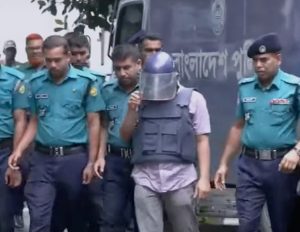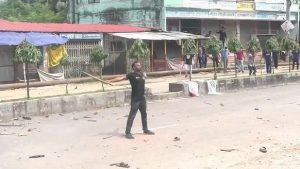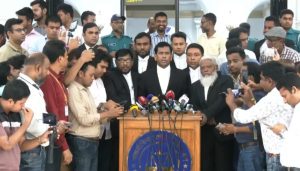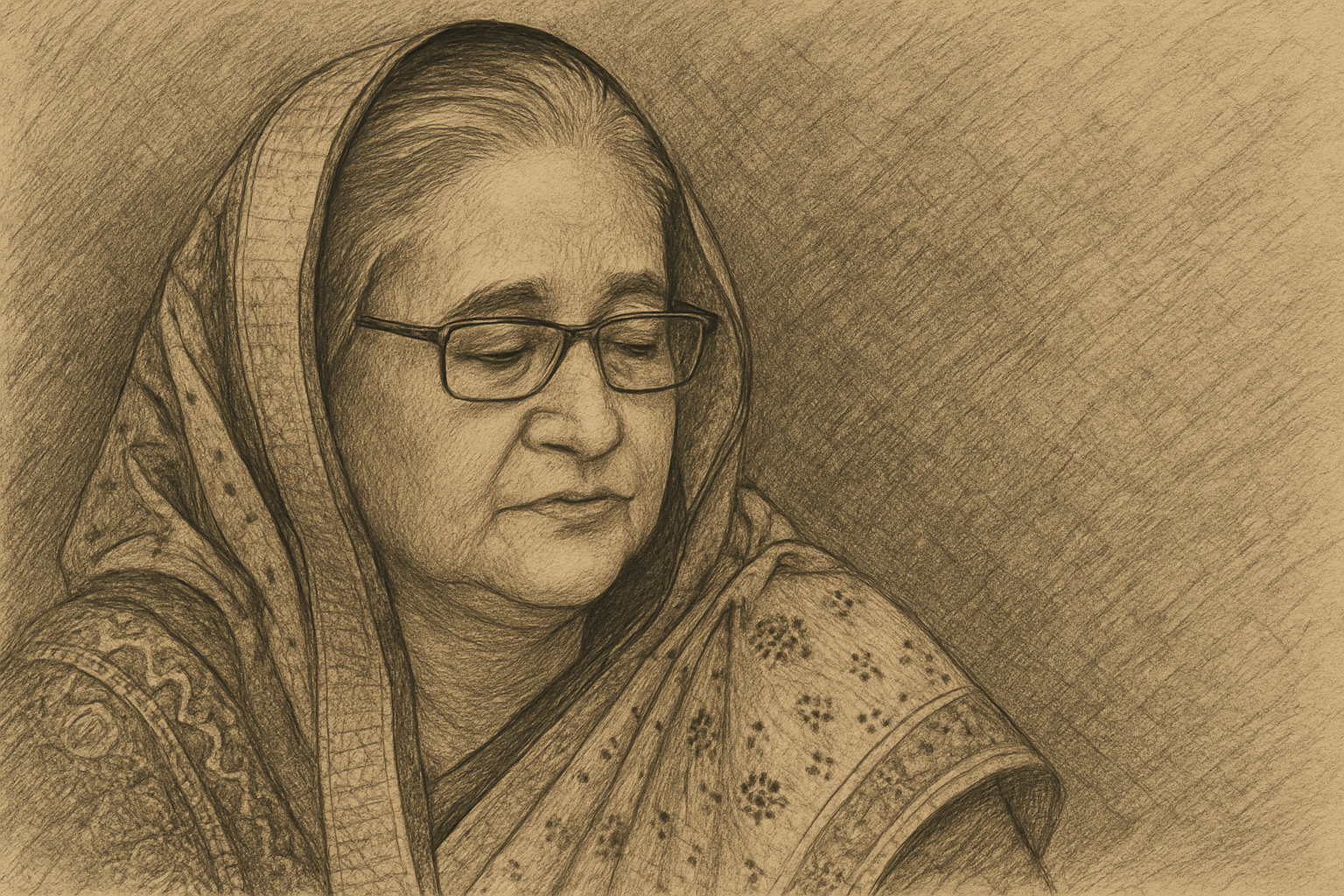On a day of historic courtroom drama, the International Crimes Tribunal-1 formally framed charges against ousted Prime Minister Sheikh Hasina and two others over their alleged involvement in crimes against humanity during the July mass uprising of 2024, marking the official commencement of trial proceedings.
This is the first time Sheikh Hasina faces prosecution in a case of crimes against humanity, in the very tribunal her government had established in 2010 to try atrocities committed during the 1971 Liberation War.
Ironically, the tribunal now turns its focus on events that occurred under her own administration, as investigators allege that state-led violence in July and August 2024 led to the killing of nearly 1,500 protesters and left over 25,000 injured, many of them permanently disabled.
In a remarkable turn during Thursday’s hearing, the only arrested accused– former Inspector General of Police (IGP) Chowdhury Abdullah Al-Mamun– stood in the dock and declared, “I plead guilty,” reading from a small piece of paper in English. He then sought to become an “approver”, a state witness. The court assured consideration of his security plea and acknowledged that he would be treated as a witness, pending further review.

Chief Prosecutor Tajul Islam confirmed the development in a post-hearing press conference, stating that Mamun’s decision would aid the full revelation of what transpired during the crackdown. “He was a top-level official, he knew everything,” Islam said. “His cooperation as an approver will be crucial to exposing the entire chain of command behind the crimes.”
The tribunal set 3 August for the prosecution’s opening statement, with witness examination to begin the following day. Judges also rejected the discharge petitions filed on behalf of fugitive accused Sheikh Hasina and former Home Minister Asaduzzaman Khan Kamal, who are both being represented by state-appointed defence lawyers.
Justice Mohammad Golam Mortuza, who presides over the tribunal, read out the order shortly after noon, with Justice Mohitul Haque Enam Chowdhury detailing the charges, which include incitement, conspiracy, murder, and direct involvement in crimes against humanity.
According to the prosecution, five distinct charges have been framed:
The first charge stems from Sheikh Hasina’s 14 July (2024) press conference, where she allegedly incited violence by branding anti-discrimination student protesters as descendants of “collaborators.” This, the tribunal said, led to state-sanctioned violence carried out by law enforcement and armed ruling party affiliates, resulting in mass killings and injuries.
The second charge accuses Hasina of ordering lethal action using helicopters, drones, and deadly weaponry to “eliminate” protesters, directives allegedly executed by Kamal and Mamun.
The third charge pertains to the killing of Abu Sayeed, a student of Begum Rokeya University in Rangpur, again citing incitement and conspiracy from the accused.

The fourth charge details the targeted killing of six demonstrators in Dhaka’s Chankharpul area on 5 August. The tribunal noted that orders, assistance, and conspiratorial coordination for the shootings were attributed to the trio.
In the fifth and perhaps most harrowing charge, the tribunal recounted an incident in Ashulia, where six protestors– one of them still alive– were shot with submachine guns and burned using petrol inside a police van. Justice Enam, while reading the charge, visibly shaken, uttered “Na’uzubillah” (God forbid) in reaction to the brutality described.
Prosecutor Tajul Islam elaborated: “They wrapped the injured and deceased in a tarp, placed them in a van, and poured petrol before setting it ablaze. One victim was still alive, moving his hands and legs. They did not rescue him, nor seek medical help. Instead, they added more firewood to ensure complete destruction.”
The tribunal accused the defendants of murder, torture, burning of both dead and living persons, incitement, and conspiracy– all constituting crimes against humanity.
Following the reading of charges, the tribunal asked Mamun, the only accused present, if he had anything to say. Dressed in a shirt, he stood, took the microphone, and calmly acknowledged his guilt in English. “I plead guilty,” he repeated.
Defence counsel Zayed Bin-Amjad, representing Mamun, requested the tribunal to ensure his client’s safety and solitary confinement in jail. The court gave assurances it would address the concern.
When asked whether Mamun would be acquitted in return for testifying, Chief Prosecutor Islam said, “It is entirely within the tribunal’s discretion. If his testimony offers full and truthful disclosure, the court may pardon him, but that decision lies solely with the judges.”

State-appointed defence lawyer Amir Hossain, representing Hasina and Kamal, told reporters that the legal battle is far from over. “Charges have been framed, but we retain the right to cross-examine and challenge evidence during trial,” he said. “Just because one accused pleads guilty does not mean the others are automatically guilty.”
He added, “An individual may have personal culpability. But guilt cannot be presumed for the others solely based on his admission. We will challenge the prosecution’s case at every stage.”
Since the political upheaval of 5 August last year, the tribunal’s composition, prosecution team, and investigative structure underwent sweeping changes. Several current prosecutors, previously known for defending Jamaat leaders in 1971 war crimes trials, have now taken up key roles.
Still, Prosecutor Islam emphasised that this new wave of trials is not about revenge. “This tribunal is not a tool for retribution. We are here to deliver justice, not settle past political scores,” he said.


